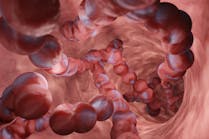A clinical trial at the National Institutes of Health found that a medication, denosumab, significantly reduced abnormal bone turnover in adults with fibrous dysplasia, a rare disease marked by weak and misshapen bones.
Bone turnover, a process in which old bone is continuously replaced with new bone, is unusually accelerated in fibrous dysplasia and contributes to bone abnormalities. The study of eight participants was carried out by researchers from the National Institute of Dental and Craniofacial Research (NIDCR) and the NIH Clinical Center. The results, which showed that denosumab may improve patients’ quality of life by enabling healthy bone formation, were published as a correspondence report in the New England Journal of Medicine.
Denosumab is a medication licensed by the U.S. Food and Drug Administration to treat bone problems from osteoporosis and cancer. It blocks a protein called RANKL (receptor activator of nuclear factor kappa-Β ligand), which is elevated in patients with fibrous dysplasia and is thought to boost bone turnover.
In the phase 2 clinical trial, eight women received high doses of denosumab over six months. At the end of the treatment period, patients’ bone biopsies and scans showed a marked reduction in bone turnover within lesions. Proteins in the blood associated with bone turnover also dropped to normal levels. These results indicated that the treatment improved the quality and strength of patients’ bones.
Patients also noted reduced complications while taking denosumab. One patient with lesions in the ribs reported increased lung function. Another participant with fibrous dysplasia in the skull experienced vision improvements.
While denosumab showed promise, abnormal bone turnover returned for all but one of the patients after they stopped taking the medication. In four patients, bone turnover exceeded pre-treatment levels.





